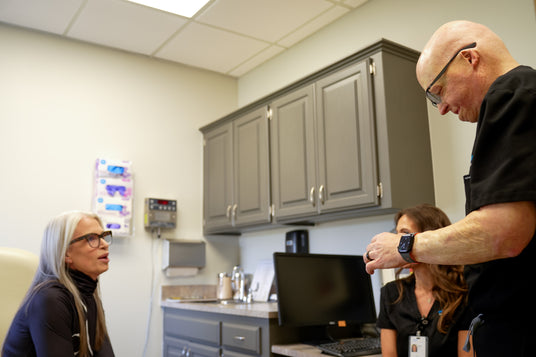
Gastric Sleeve Surgery in Edmond, Oklahoma
The Laparoscopic Sleeve Gastrectomy is a surgery that removes approximately 75% of the stomach. The portion that is left is "sleeve-shaped" and roughly the size of a small banana. This procedure helps you feel full on much less food, and reduces hunger hormones. It is preformed laparoscopically, which means smaller incisions and faster recovery!
Lose Weight
Feel Better
Be Healthy
Live Long

The appeal of the gastric sleeve at WeightWise is the simplicity: unlike the gastric bypass, the gastrointestinal tract isn’t rearranged. The sleeve delivers excellent weight loss results, with very few limitations and many benefits:
- Most common operation performed
- Significant weight loss- 50%-70% of excess weight
- No foreign objects in body
- No re-routing of intestines
- Good resolution of Type 2 diabetes and other co-morbidities
- Can continue to take anti-inflammatory medications if needed
At WeightWise, we are invested in your success! You will be connected with a Patient Advocate who will guide you through your journey from start to finish. This includes visits with our behavorial health psychologist, registered dietitians, and exercise physiologist.
For more information on how to begin your transformation call us at 405-359-2475 or attend a free online bariatric surgery seminar.
Gastric Sleeve FAQs
Who is a good candidate for a Gastric Sleeve?
Who is a good candidate for a Gastric Sleeve?
The Sleeve Gastrectomy is a great option for patients who have a lower relative BMI, no history of gastric reflux (GERD), and need to retain the ability to take NSAIDS.
The WeightWise Process
The WeightWise Process
At WeightWise, we are committed to the patient as a whole. This process consists of a medical evaluation, psychological screening, conversations with dietitians and exercise physiologists, and a sleep evaluation. All of this is done to make sure you don't have any underlying issues and understand everything that goes into a gastric sleeve surgery.
Medical Evaluation
This is when you meet with our providers to get an overview of your current health and investigate which procedure is right for you. Not every client is in the same situation and no procedure is one size fits all. During this evaluation, any medical issues you may have will be addressed.
We’ll also talk about your physical history as a whole. Have you tried dieting or exercising in the past? What worked and what didn’t? Were there major injuries or life events that got in the way of you living a healthy lifestyle? This will help WeightWise craft the perfect weight loss plan for you.
Psychological Screening
At WeightWise, we want to make sure you are mentally, as well as well as physically ready for the gastric sleeve surgery. There is more to these procedures than coming in, have the procedure, and then leaving. We want to make sure you understand what is about to happen to you and your body.
This is a big life moment for our patients. The body will undergo a massive change, which means your lifestyle will need a big change, too. We want to make sure you’re in the right place mentally for the surgery and help you work through any roadblocks you may have.
Dietitian Consult
While the gastric sleeve will physically limit your food intake, it is possible to hurt or even injure yourself if you deviate from your new lifestyle. Our dietitians will discuss your past eating habits, nutritional knowledge, and trigger points you have that may negatively impact your food consumption. They will also outline a plan for the rest of your life.
This process doesn't have to be stressful! Once you understand why you’re doing this, it will be easier to see yourself eating less, becoming more healthy, and feeling better than you have in a long time. We’ll show you how you can still enjoy food, too!
Incorporating Physical Activity
While the gastric sleeve procedure and improving your eating habits are certainly great ways to lose weight, instituting an exercise regimen will help you keep the weight off. Will you need to run three miles every day and hit the weights? Of course not!
Our exercise physiologist will outline a program specifically for you and discuss both short- and long-term goals. Although, if one of those goals happens to include running a marathon or becoming a powerlifter, we can help you reach those heights. But improving your cardiovascular system, flexibility, and overall strength are the main concerns.
Sleep Evaluation
Finally, we will talk to you about sleep apnea and how it can affect the success of the gastric sleeve surgery both during and after the procedure. We want this lifestyle change to work as much as you do, so we will investigate if you suffer from sleep apnea or not.
All of this is to ensure you have all the information you need to make this very important decision. WeightWise wants all of our patients to live long, productive lives well after the gastric sleeve surgery. That’s why these consultations are so important – the more we know about our patients, the better it is before, during, and after the procedure.
Risks and Benefits of a Gastric Sleeve
Risks and Benefits of a Gastric Sleeve
With any weight loss surgery, there is a small risk of a staple line leaking or bleeding, and infection. With the sleeve specifically, the risks are limited to developing new onset or worsening reflux. The benefits are endless: Significant weight loss, good resolution of co-morbidities, and an active and vigorous life! They definitely outweigh the risks in our opinion!
Recovery Timeline
Recovery Timeline
As with any laparoscopic procedure, recovery is quick with minimal pain. You will stay in the hospital for observation for two nights and most patients usually resume their normal activities within a week!
General Questions
General Questions
Will my stomach stretch back out? Over time your stomach can relax slightly, but it will never stretch to the size it was before surgery
Is there a device that is placed? No, we are removing part of the stomach. Nothing is placed.
Do you remove the portion of the stomach that makes hunger hormones? Yes, the portion of the stomach that makes ghrelin, a hunger hormone, is removed.
Will the sleeve give me reflux? There is a larger chance of developing reflux with the sleeve over other procedures, but we have had many patients who have not developed reflux post surgery.
